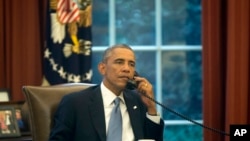U.S. lawmakers are speaking out hours before President Barack Obama's address on combating Islamic State militants. The prospect of U.S. action has revived longstanding debates on Capitol Hill about the use of military force in the age of global terrorism.
As the president prepared to address the nation, Senate Majority Leader Harry Reid urged colleagues not to prejudge Obama's message.
"Would it not be a good idea for us to stand back and see what the president has to say tonight? Let us allow him to speak to our country, our fellow citizens, and lay out his plan,” said Reid.
Lawmakers are keenly aware that many U.S. voters are war-weary, yet alarmed by Islamic State radicals.
Republican Senator Ted Cruz said, “We are tired of sending our sons and daughters potentially to die in distant lands. No one wants to see an extended engagement in Iraq. But at the same time, I do not believe the American people are one bit reluctant to defend our national security, to defend the lives of fellow Americans.”
Senate Minority Leader Mitch McConnell urged the president to deliver a concrete plan of action, not a lecture. He accused the president of being too quick to withdraw U.S. troops from combat zones and slow to recognize grave threats.
"The president is a rather reluctant commander-in-chief. Much has occurred to undermine our national security. Tragically, the president has not adapted accordingly," said McConnell. "We have seen the failure to negotiate a Status of Forces agreement with Iraq that would have allowed for a residual U.S. military force, and likely prevented the assault by the Islamic State."
Reid countered that the United States learned a painful lesson after the 2003 invasion of Iraq -- an experience, he argued, that must not be repeated. That message was echoed by the chairman of the Senate Armed Services Committee, Democrat Carl Levin.
“The president and Secretary [of State John] Kerry are making every effort to help lead a broadly-based coalition, which is critically important to avoid the consequences of a western, go-it-alone approach which was mistakenly used when we invaded Iraq," said Levin. "This president, like all presidents, will welcome bipartisan congressional support, even though he has the authority in this situation to act without explicit congressional authority.”
Other senators insist congressional authorization is required before the United States embarks on any extended military campaign against the Islamic State -- a point of contention that will continue after the president’s address.




